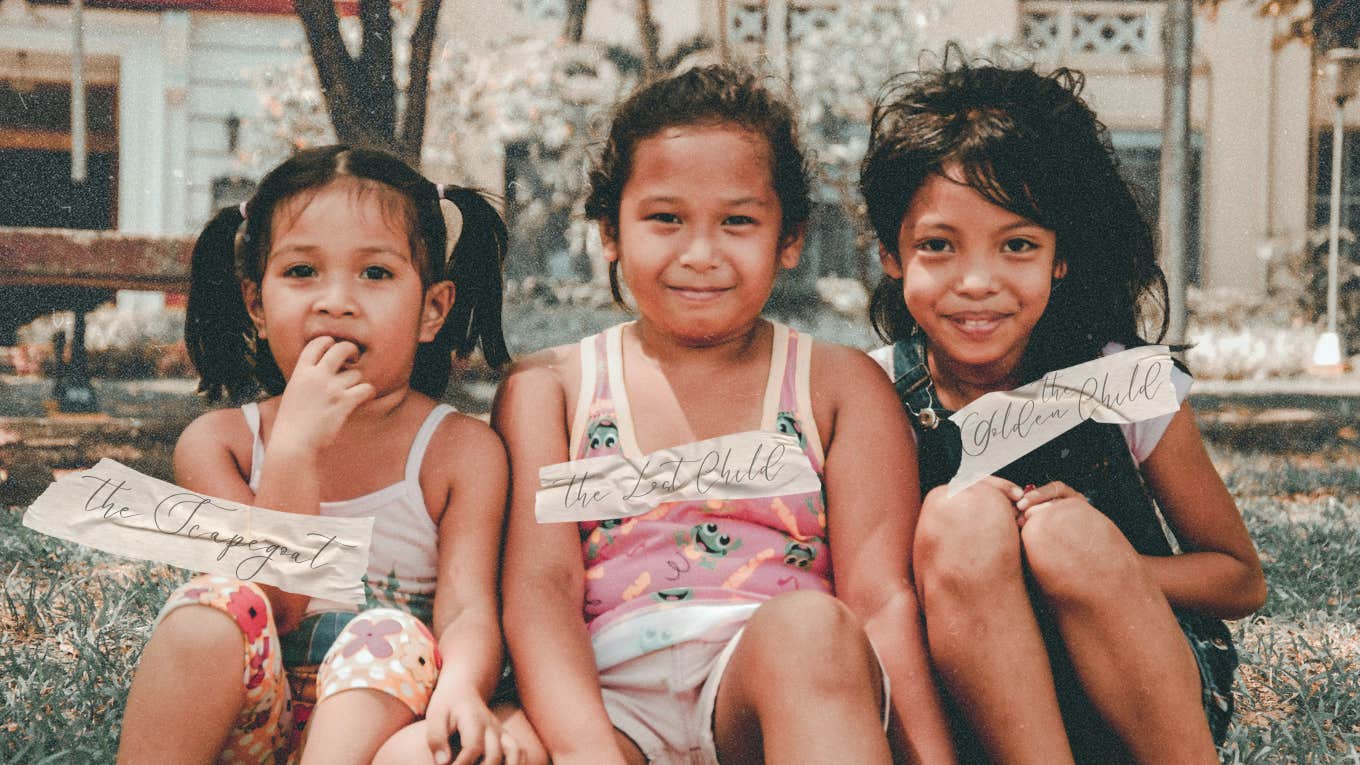Narcissistic Parents Assign Roles To Their Children — Which Is Yours?
If you grow up with a narcissist, they label you from a young age in a way that is difficult to escape.
 Charlein Gracia | Unsplash
Charlein Gracia | Unsplash If you grew up as the child of a narcissist, it is quite common for them to cast you into a certain role within the family that you can’t escape no matter how hard you try. As long as you stay in a relationship with the narcissist, they are going to keep treating you the same way that they did in childhood, no matter how much you try to change to please them.
There are some typical roles that narcissistic parents will typically assign to their children, which are referred to as the Scapegoat child, the Lost Child and the Golden Child. There may be more than one of these, depending on how many children are in the family.
If you have recently begun to suspect that one or both of your parents is a narcissist, then looking at the roles that children were asked to play within the family can help to determine if this is the case.
When I was growing up, I didn’t know these labels as a child. However, I did know that my sister was the “good child” and I was the “bad child” in the family. No matter how much I tried to please my parents, there was nothing I could do to get out of being cast in this role.
The Scapegoat
For me, the scapegoat role persisted even into adulthood. No matter how successful I was, there was nothing that I could do that was “good enough” for my narcissistic mother. I couldn’t please her no matter how hard I tried, and it was quite hurtful to be in a relationship with someone who couldn’t accept me as I am.
The Golden Child
Being the “golden child” of a narcissistic parent isn’t all sunshine and roses either, though. No matter how much it may seem that way in terms of praise, privileges, and financial support they receive from their narcissistic parent.
According to Daughters of Narcissistic Mothers:
"The Golden Child can end up very engulfed by the Narcissistic Mother, and her life can end up being enmeshed in the Narcissistic Mother’s. She may well grow without proper boundaries and proper self-identity. She is likely to remain, either forever or for a long time, as a puppet of the Narcissistic Mother, and if she ever does manage to break free, that process will be infinitely more painful for her than it is for the Scapegoat."
This is true for my sister as she is the golden child of our family. As an adult, she is codependently enmeshed with our mother. This holds true even though she has a family of her own. For years, she would have dinner with our mom every night and have my mom babysit her daughter every day. They lived together for years.
The Lost Child
In families with more children, there may also be a lost child. This is a child that is somewhere in between the scapegoat and the golden child, who receive most of the attention, both the positive and the negative. The lost child will receive less attention than the others, and often have to fend for themself, and may feel like they are raising themselves.
Although the lost child isn’t abused in the same way as the scapegoat child, they are still being abused by the narcissistic parent. In some cases, they may feel like they are invisible. Unseen and unheard, they may learn to be very independent but also have low self-esteem.
Family Dynamics
When the narcissistic parent assigns these roles to their children, it will often pit the children against each other in competition. Love, care, and approval are scarce resources in a narcissistic household, and children may fight with each other to win the approval of their parents.
In my case, since I was the oldest and also the scapegoat, I did the best I could to protect my little sister from our parents, by taking on most of the punishments. I felt like, if I kept their attention off of her, then she wouldn’t be hurt by them the way that I was. It was misguided, but I didn’t resent my sister until adulthood.
Then, I felt like it wasn’t fair that my sister was always treated better than I was, as the differences began to be more apparent to me. In my first year of college, my parents paid $500 for half of my laptop. In my sister’s first year of college, they paid $27,000 for her to live on campus at a private university.
The stark differences only got wider as we got older. Time, money, and care were always prioritized to my sister over me. It was the same with the grandkids. My sister’s daughter was always the favorite with grandma — by leaps and bounds. It was when I saw my daughter cast into the same role I had taken on that I began to make changes.
You would think that being the scapegoat would be the worst role in the family, but oftentimes, it is the scapegoat that can break away from the family and assert themselves and their needs. By doing this, they can break the toxic cycle of narcissistic abuse, and stop it from passing down to their children.
By contrast, according to psychotherapist Amanda Robins:
"While the golden child hovers around the narcissistic hearth, unable to exert even a practicing identity, the scapegoat will normally escape the family home early to exert their independence. Although they will retain deep wounds from the toxic parenting they received, scapegoats are normally healthy enough to recognize that their upbringing was faulty and that they need help."
Though the scapegoat will often recognize the unhealthy patterns of trauma and abuse for what they are, and be able to get free, the golden child may remain enmeshed with their narcissistic parent for life. They don’t understand that this isn’t how normal, healthy relationships work. They do get some benefit from the relationship with the narcissist, and so they stay.
When parental estrangement happens, often sibling estrangement will result as well. If only one child can see the family for what it is, then there is little common ground to be seen between siblings.
My sister summed it up once very succinctly when she told me, “Your experience of our family was very different than mine.”
With a narcissistic family, this is frequently the case. Since each child has a role to play within the family, they will each have very different relationships with their parents. This can lead to tumultuous relationships between the siblings as well.
Finding healing
If you have been raised by a narcissist, no matter which child you were in the family, it is important to look for healing as an adult. Finding a good therapist who is skilled in working with trauma and narcissistic families is extremely helpful for anyone who has grown up this way.
When you have grown up with a narcissist, you may be experiencing all sorts of mental health issues or relationship difficulties as an adult. Many adult children of narcissists will have anxiety, depression, or PTSD as a result. In therapy, you can address these issues as well. Once in therapy, you can learn coping skills and take medications to help with your symptoms.
Also, you can learn relationship skills that apply not only to your family but to romantic relationships, friendships, and work relationships as well. Learning communication skills is especially helpful after growing up with a narcissist. Many of us have difficulty talking about feelings because we learned to shove our feelings down as children.
Since feelings are the building blocks of relationships, being unable to process our feelings and communicate about feelings with others can lead to troubled relationships in adulthood as well. When you are in therapy, you can learn better communication, and relationship skills from your therapist. This can help you seek out healthier relationships in the future.
Therapy can also teach you to set boundaries with your narcissistic parent, and possibly other family members. As you do this, you may consider reducing contact with your family or cutting off contact altogether. These are not decisions to take lightly, and having a therapist to help you through the decision can be a huge benefit.

Photo: Alena Shekhovtcova/Pexels
Nicole Dake is a blogger, author, and life coach. Nicole blogs about parenting with a focus on mental health, self-improvement, and spirituality.

